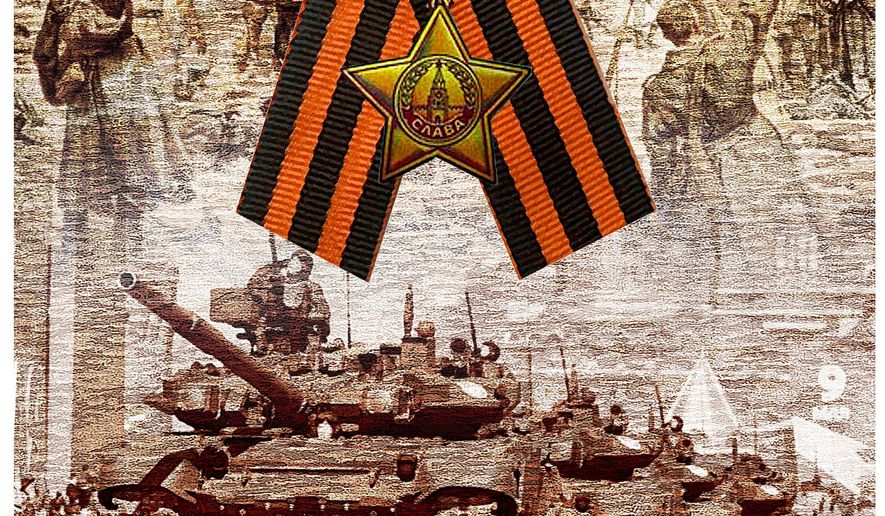OPINION:
Two years ago, I stood in Moscow’s Red Square, a privileged spectator at the annual May 9 Victory Day, Russia’s version of V-E Day, which features a parade commemorating the defeat of Nazi Germany. As our country’s senior military attache to Moscow, I joined other foreign officers and proud Russian veterans of the “Great Patriotic War.” We all wore the patriotic orange-and-black-striped St. George’s Ribbon, signifying great Russian military moments, particularly the decisive defeats of Napoleon and Hitler’s Germany. The vets sipped vodka between lusty “urrahs,” the crowd cheered, and good fellowship prevailed. Families with adoring grandchildren escorted the old warriors. For a few hours, old alliances came back to life. Thousands of well-rehearsed Russian soldiers strutted past President Putin and his court. One after another with colorful standards flying, elite units goose-stepped by, heels cracking down in unison.
The parade was, by tradition, also a showcase for Russia’s newest military hardware. Modern tanks, personnel carriers, artillery and air-defense vehicles ground over the flagstones, followed by massive nuclear-capable ballistic missile carriers. Fighters and bombers thundered overhead. On that Victory Day in 2013, with U.S.-Russian relations soon to collapse, Russians were celebrating their proudest achievement of the last century.
We must remember that these veterans had violently and unnaturally lost more than 25 million friends and comrades in their Great Patriotic War, including many civilian family members. The still poignant memory of that loss — dwarfing our own costly sacrifice of a half-million mostly military souls — is a key for better understanding Russia’s suspicious view of today’s Western world.
Much changed, however, in 2014’s troubling Victory Day festivities. Russia’s increasingly open celebration of its illegal annexation of Crimea just after the Sochi Olympics, and, more subtly, its proxy-backed aggression in eastern Ukraine, hijacked the main World War II theme of this event. Accordingly, the United States and many other countries boycotted the 69th anniversary parade.
That time, I watched the parade from the street in blue-jeans — the vehicular armada roared right past our Embassy on the Garden Ring Road. Disturbingly, symbols of Crimea and the Donbass were in evidence — mostly little pennants on a number of vehicles. Some flags were also carried by Russian spectators and available in numerous shops and kiosks. Some units and personnel that had participated in these invasions no doubt marched in the 2014 parade, and all the vehicles were now striped with St. George’s colors.
For these and other reasons highlighted below, the United States and many like-minded countries have fittingly declined attendance in Moscow for the 70th anniversary. By all accounts, it will be the biggest ever — a huge, modern and triumphant extravaganza extolling the virtues of not just Russian victories past, but also amplifying the power and growing capability of its current military might. For a country that perceives a world of mostly existential threats, this parade is domestically comprehensible but not internationally defensible. At this tense pivotal time, we all collectively should be downplaying displays of extreme military might. For many world leaders who respect the international rule of law, officially attending such a parade with likely units and personnel that participated in Crimean and eastern Ukraine incursions, along with a roll-by and fly-by of loudly trumpeted nuclear capable assets, is completely inappropriate.
I’m not sure most Russians understand how much this repels us. Those citizens who noticed certainly didn’t understand why we, and other nations, rejected wearing the increasingly nationalistic St. George’s ribbon in Moscow last year. This nuance was lost on them. Fueled by extraordinary disinformation, many simply do not comprehend why the world, especially the West, has reacted so negatively to their regime’s actions. I repeatedly heard people say: “It’s our land, our people, what’s the big deal?” referring to Russia’s annexation of the Crimea. Meanwhile, petulantly inviting North Korea’s repugnant Kim Jong-un — who ultimately declined — to attend the parade after many world leaders of gravitas decided not to come bespeaks how internationally tone-deaf senior Russian leadership have become.
I emphatically do not want to denigrate the extreme sacrifice and commitment of the Russian veterans and population that persevered so heroically during the most horrific military campaign in modern military history. They richly deserve continued recognition. V-E Day is important also to the United States and other Allied and non-Russian Soviet veterans, too. But first and foremost, it is a distinctly Russian celebration. We should honor it, celebrate and even share in it as we did in 2010, but not in hyper-politicized Moscow and increasingly militarized Russia at this time.
• Peter Zwack is a retired U.S. Army brigadier general who served from 2012 to 2014 as the U.S. senior defense official and attache to the Russian Federation.




Please read our comment policy before commenting.